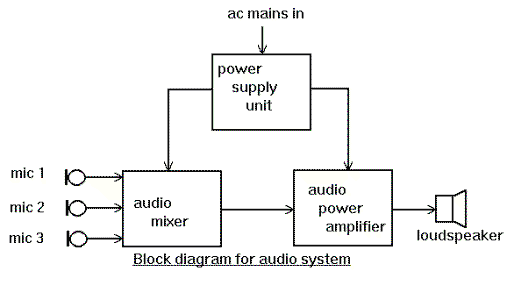|
 Block diagrams are a
method of explaining
complex systems (not
necessarily electronic)
in a simple manner.
They are made up from
labeled blocks which
are joined by arrows.
The arrows indicate the
direction of flow, and
inputs to and outputs
from the blocks.
We are told what each
block has for an input,
and what happens in the
block to this input. We
are also told what the
output from the block
is.
At this stage it is not
necessary to know how
the block does its job.
That will come later
with a greater
understanding of
electronics.
In the example the low
level signals from the
three microphones are
mixed together by the
MIXER which gives a
mixed low level signal
out.
The mixed signal is
applied to the POWER
AMPLIFIER which provides
a high level signal to
drive the loudspeaker.
The POWER SUPPLY UNIT
converts the ac mains
supply voltage to a dc
voltage suitable for the
system.
Even with this limited
knowledge we can apply a
little logical fault
finding.
If there is no output
from the loudspeaker but
we can measure an output
from the mixer then the
loudspeaker or the power
amplifier is faulty.
There would be no point
in changing the mixer.
With more knowledge one
can break the blocks
down into smaller blocks
and finally the
circuitry within the
boxes will be
understood.
There are more pages on
this website, being used
to explain complex
electronics. |